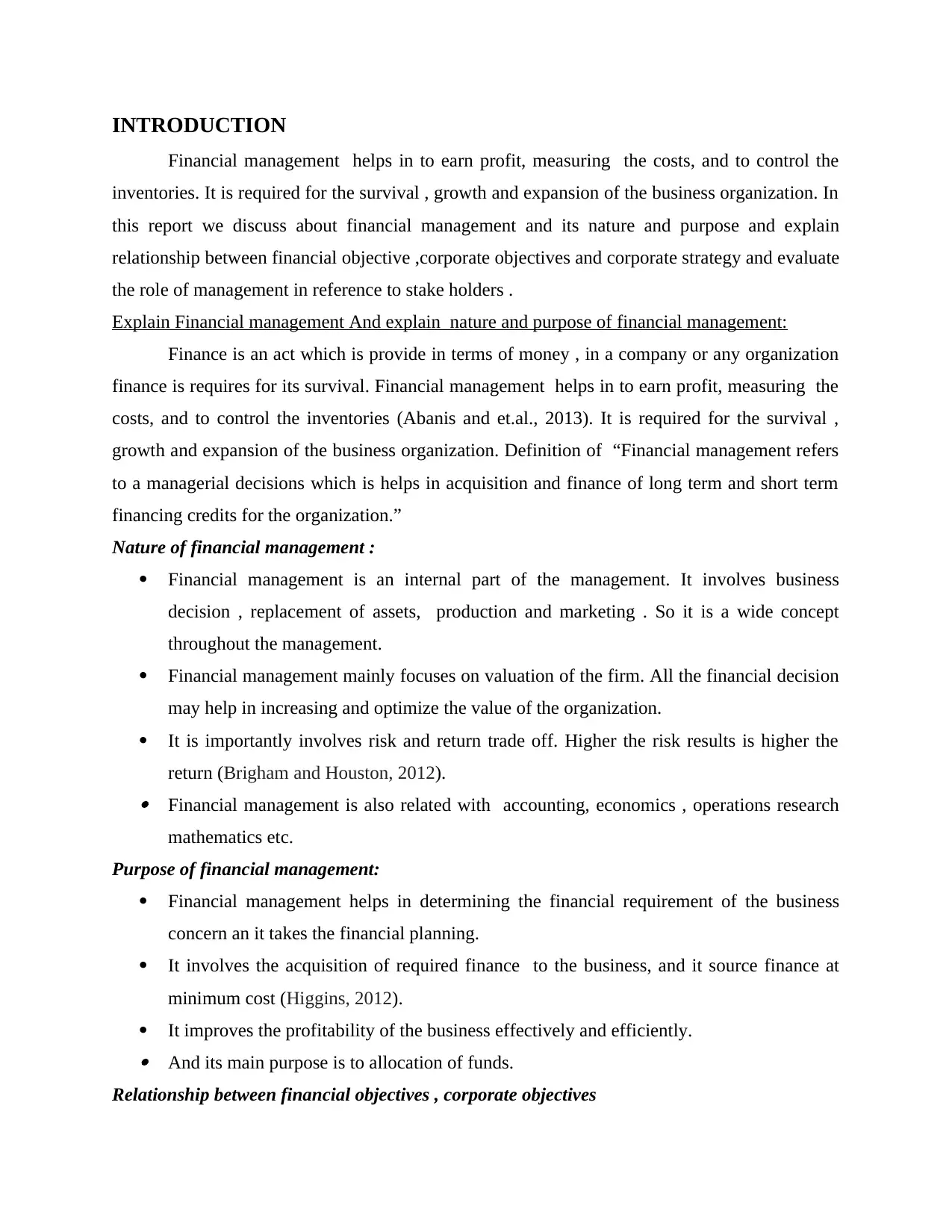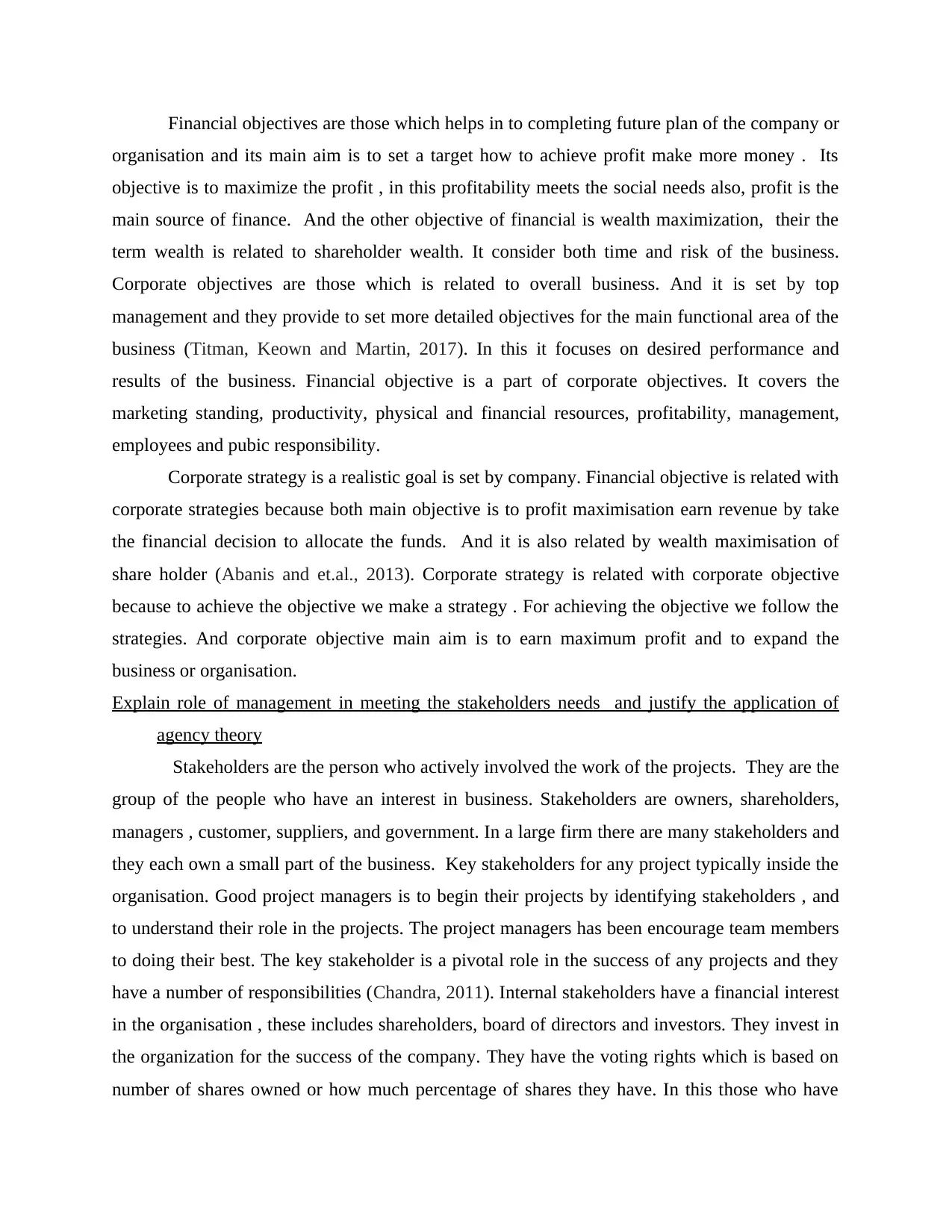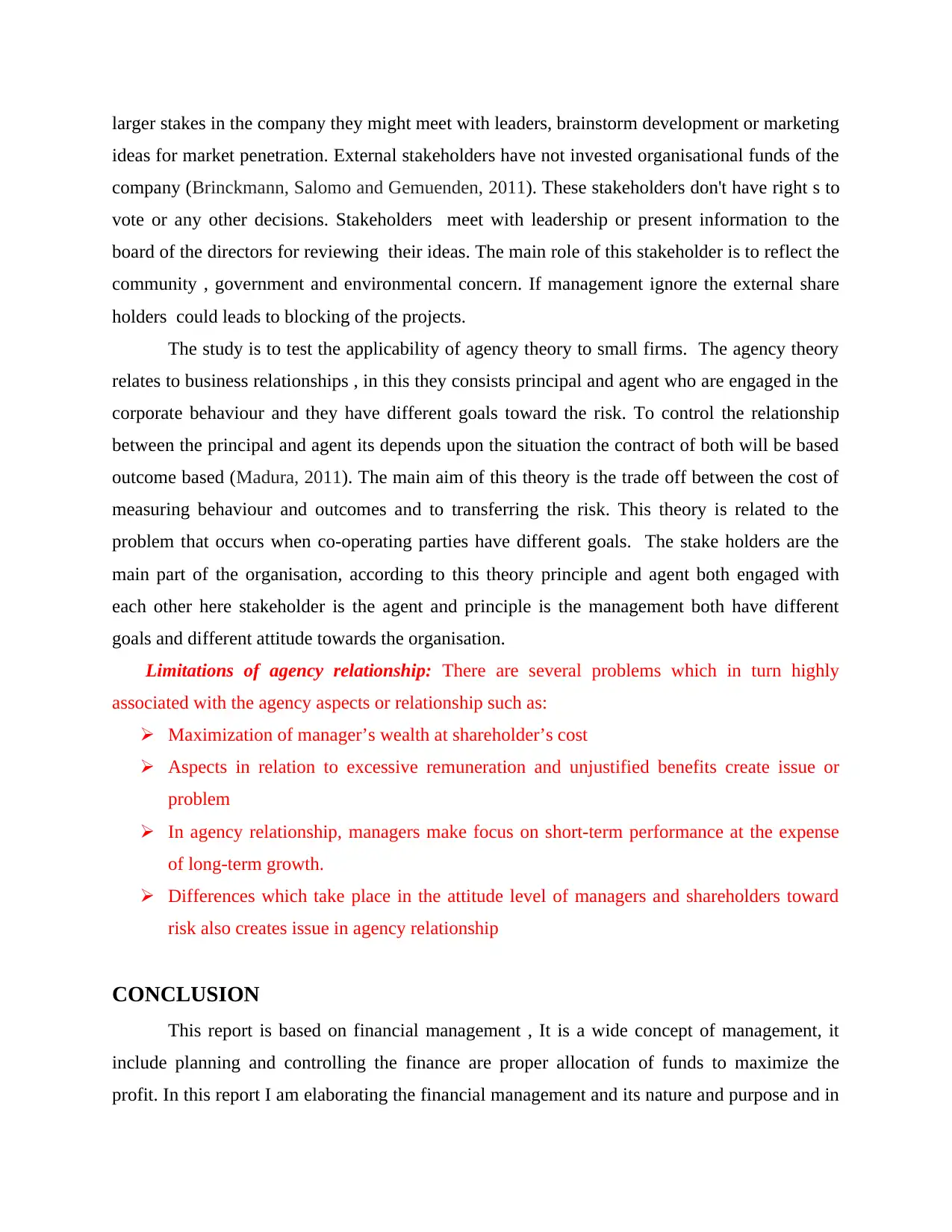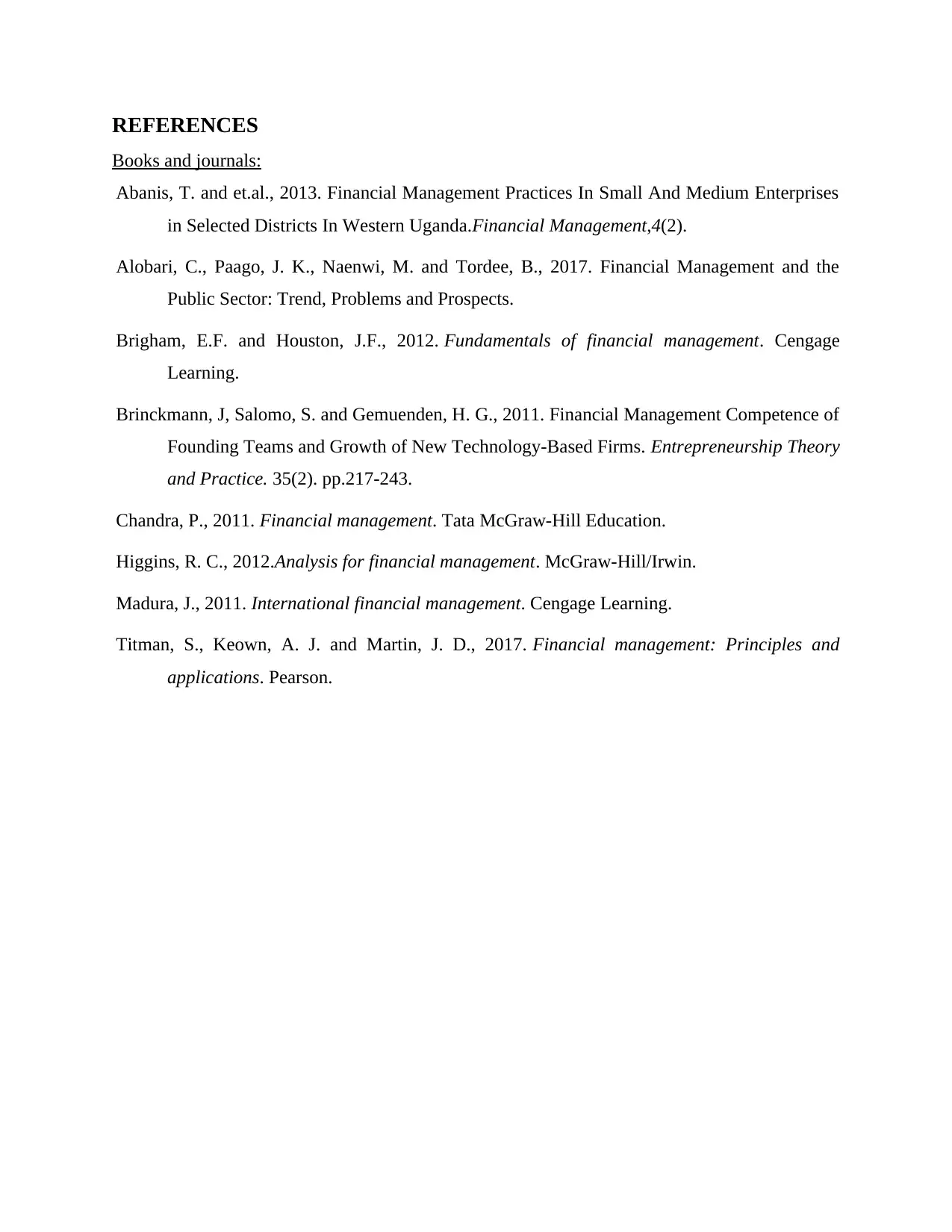Financial Management Report: Stakeholders and Objectives
VerifiedAdded on 2021/01/02
|7
|1510
|460
Report
AI Summary
This report provides a comprehensive overview of financial management, exploring its nature, purpose, and significance in business organizations. It delves into the core concepts of financial management, including profit maximization, cost control, and inventory management, highlighting their importance for business survival, growth, and expansion. The report examines the relationship between financial objectives, corporate objectives, and corporate strategies, emphasizing the role of financial decisions in achieving overall business goals. Furthermore, it analyzes the role of management in meeting stakeholder needs, including shareholders, managers, customers, suppliers, and the government, and justifies the application of agency theory in managing the relationships between principals and agents within a company. The report concludes by summarizing the key findings and emphasizing the interconnectedness of financial management principles and their impact on organizational success.

FINANCIAL
MANAGEMENT
MANAGEMENT
Paraphrase This Document
Need a fresh take? Get an instant paraphrase of this document with our AI Paraphraser

Table of Contents
INTRODUCTION...........................................................................................................................3
Explain Financial management And explain nature and purpose of financial management:....3
Explain role of management in meeting the stakeholders needs and justify the application of
agency theory..............................................................................................................................4
CONCLUSION................................................................................................................................5
REFERENCES................................................................................................................................6
INTRODUCTION...........................................................................................................................3
Explain Financial management And explain nature and purpose of financial management:....3
Explain role of management in meeting the stakeholders needs and justify the application of
agency theory..............................................................................................................................4
CONCLUSION................................................................................................................................5
REFERENCES................................................................................................................................6

INTRODUCTION
Financial management helps in to earn profit, measuring the costs, and to control the
inventories. It is required for the survival , growth and expansion of the business organization. In
this report we discuss about financial management and its nature and purpose and explain
relationship between financial objective ,corporate objectives and corporate strategy and evaluate
the role of management in reference to stake holders .
Explain Financial management And explain nature and purpose of financial management:
Finance is an act which is provide in terms of money , in a company or any organization
finance is requires for its survival. Financial management helps in to earn profit, measuring the
costs, and to control the inventories (Abanis and et.al., 2013). It is required for the survival ,
growth and expansion of the business organization. Definition of “Financial management refers
to a managerial decisions which is helps in acquisition and finance of long term and short term
financing credits for the organization.”
Nature of financial management :
Financial management is an internal part of the management. It involves business
decision , replacement of assets, production and marketing . So it is a wide concept
throughout the management.
Financial management mainly focuses on valuation of the firm. All the financial decision
may help in increasing and optimize the value of the organization.
It is importantly involves risk and return trade off. Higher the risk results is higher the
return (Brigham and Houston, 2012). Financial management is also related with accounting, economics , operations research
mathematics etc.
Purpose of financial management:
Financial management helps in determining the financial requirement of the business
concern an it takes the financial planning.
It involves the acquisition of required finance to the business, and it source finance at
minimum cost (Higgins, 2012).
It improves the profitability of the business effectively and efficiently. And its main purpose is to allocation of funds.
Relationship between financial objectives , corporate objectives
Financial management helps in to earn profit, measuring the costs, and to control the
inventories. It is required for the survival , growth and expansion of the business organization. In
this report we discuss about financial management and its nature and purpose and explain
relationship between financial objective ,corporate objectives and corporate strategy and evaluate
the role of management in reference to stake holders .
Explain Financial management And explain nature and purpose of financial management:
Finance is an act which is provide in terms of money , in a company or any organization
finance is requires for its survival. Financial management helps in to earn profit, measuring the
costs, and to control the inventories (Abanis and et.al., 2013). It is required for the survival ,
growth and expansion of the business organization. Definition of “Financial management refers
to a managerial decisions which is helps in acquisition and finance of long term and short term
financing credits for the organization.”
Nature of financial management :
Financial management is an internal part of the management. It involves business
decision , replacement of assets, production and marketing . So it is a wide concept
throughout the management.
Financial management mainly focuses on valuation of the firm. All the financial decision
may help in increasing and optimize the value of the organization.
It is importantly involves risk and return trade off. Higher the risk results is higher the
return (Brigham and Houston, 2012). Financial management is also related with accounting, economics , operations research
mathematics etc.
Purpose of financial management:
Financial management helps in determining the financial requirement of the business
concern an it takes the financial planning.
It involves the acquisition of required finance to the business, and it source finance at
minimum cost (Higgins, 2012).
It improves the profitability of the business effectively and efficiently. And its main purpose is to allocation of funds.
Relationship between financial objectives , corporate objectives
⊘ This is a preview!⊘
Do you want full access?
Subscribe today to unlock all pages.

Trusted by 1+ million students worldwide

Financial objectives are those which helps in to completing future plan of the company or
organisation and its main aim is to set a target how to achieve profit make more money . Its
objective is to maximize the profit , in this profitability meets the social needs also, profit is the
main source of finance. And the other objective of financial is wealth maximization, their the
term wealth is related to shareholder wealth. It consider both time and risk of the business.
Corporate objectives are those which is related to overall business. And it is set by top
management and they provide to set more detailed objectives for the main functional area of the
business (Titman, Keown and Martin, 2017). In this it focuses on desired performance and
results of the business. Financial objective is a part of corporate objectives. It covers the
marketing standing, productivity, physical and financial resources, profitability, management,
employees and pubic responsibility.
Corporate strategy is a realistic goal is set by company. Financial objective is related with
corporate strategies because both main objective is to profit maximisation earn revenue by take
the financial decision to allocate the funds. And it is also related by wealth maximisation of
share holder (Abanis and et.al., 2013). Corporate strategy is related with corporate objective
because to achieve the objective we make a strategy . For achieving the objective we follow the
strategies. And corporate objective main aim is to earn maximum profit and to expand the
business or organisation.
Explain role of management in meeting the stakeholders needs and justify the application of
agency theory
Stakeholders are the person who actively involved the work of the projects. They are the
group of the people who have an interest in business. Stakeholders are owners, shareholders,
managers , customer, suppliers, and government. In a large firm there are many stakeholders and
they each own a small part of the business. Key stakeholders for any project typically inside the
organisation. Good project managers is to begin their projects by identifying stakeholders , and
to understand their role in the projects. The project managers has been encourage team members
to doing their best. The key stakeholder is a pivotal role in the success of any projects and they
have a number of responsibilities (Chandra, 2011). Internal stakeholders have a financial interest
in the organisation , these includes shareholders, board of directors and investors. They invest in
the organization for the success of the company. They have the voting rights which is based on
number of shares owned or how much percentage of shares they have. In this those who have
organisation and its main aim is to set a target how to achieve profit make more money . Its
objective is to maximize the profit , in this profitability meets the social needs also, profit is the
main source of finance. And the other objective of financial is wealth maximization, their the
term wealth is related to shareholder wealth. It consider both time and risk of the business.
Corporate objectives are those which is related to overall business. And it is set by top
management and they provide to set more detailed objectives for the main functional area of the
business (Titman, Keown and Martin, 2017). In this it focuses on desired performance and
results of the business. Financial objective is a part of corporate objectives. It covers the
marketing standing, productivity, physical and financial resources, profitability, management,
employees and pubic responsibility.
Corporate strategy is a realistic goal is set by company. Financial objective is related with
corporate strategies because both main objective is to profit maximisation earn revenue by take
the financial decision to allocate the funds. And it is also related by wealth maximisation of
share holder (Abanis and et.al., 2013). Corporate strategy is related with corporate objective
because to achieve the objective we make a strategy . For achieving the objective we follow the
strategies. And corporate objective main aim is to earn maximum profit and to expand the
business or organisation.
Explain role of management in meeting the stakeholders needs and justify the application of
agency theory
Stakeholders are the person who actively involved the work of the projects. They are the
group of the people who have an interest in business. Stakeholders are owners, shareholders,
managers , customer, suppliers, and government. In a large firm there are many stakeholders and
they each own a small part of the business. Key stakeholders for any project typically inside the
organisation. Good project managers is to begin their projects by identifying stakeholders , and
to understand their role in the projects. The project managers has been encourage team members
to doing their best. The key stakeholder is a pivotal role in the success of any projects and they
have a number of responsibilities (Chandra, 2011). Internal stakeholders have a financial interest
in the organisation , these includes shareholders, board of directors and investors. They invest in
the organization for the success of the company. They have the voting rights which is based on
number of shares owned or how much percentage of shares they have. In this those who have
Paraphrase This Document
Need a fresh take? Get an instant paraphrase of this document with our AI Paraphraser

larger stakes in the company they might meet with leaders, brainstorm development or marketing
ideas for market penetration. External stakeholders have not invested organisational funds of the
company (Brinckmann, Salomo and Gemuenden, 2011). These stakeholders don't have right s to
vote or any other decisions. Stakeholders meet with leadership or present information to the
board of the directors for reviewing their ideas. The main role of this stakeholder is to reflect the
community , government and environmental concern. If management ignore the external share
holders could leads to blocking of the projects.
The study is to test the applicability of agency theory to small firms. The agency theory
relates to business relationships , in this they consists principal and agent who are engaged in the
corporate behaviour and they have different goals toward the risk. To control the relationship
between the principal and agent its depends upon the situation the contract of both will be based
outcome based (Madura, 2011). The main aim of this theory is the trade off between the cost of
measuring behaviour and outcomes and to transferring the risk. This theory is related to the
problem that occurs when co-operating parties have different goals. The stake holders are the
main part of the organisation, according to this theory principle and agent both engaged with
each other here stakeholder is the agent and principle is the management both have different
goals and different attitude towards the organisation.
Limitations of agency relationship: There are several problems which in turn highly
associated with the agency aspects or relationship such as:
Maximization of manager’s wealth at shareholder’s cost
Aspects in relation to excessive remuneration and unjustified benefits create issue or
problem
In agency relationship, managers make focus on short-term performance at the expense
of long-term growth.
Differences which take place in the attitude level of managers and shareholders toward
risk also creates issue in agency relationship
CONCLUSION
This report is based on financial management , It is a wide concept of management, it
include planning and controlling the finance are proper allocation of funds to maximize the
profit. In this report I am elaborating the financial management and its nature and purpose and in
ideas for market penetration. External stakeholders have not invested organisational funds of the
company (Brinckmann, Salomo and Gemuenden, 2011). These stakeholders don't have right s to
vote or any other decisions. Stakeholders meet with leadership or present information to the
board of the directors for reviewing their ideas. The main role of this stakeholder is to reflect the
community , government and environmental concern. If management ignore the external share
holders could leads to blocking of the projects.
The study is to test the applicability of agency theory to small firms. The agency theory
relates to business relationships , in this they consists principal and agent who are engaged in the
corporate behaviour and they have different goals toward the risk. To control the relationship
between the principal and agent its depends upon the situation the contract of both will be based
outcome based (Madura, 2011). The main aim of this theory is the trade off between the cost of
measuring behaviour and outcomes and to transferring the risk. This theory is related to the
problem that occurs when co-operating parties have different goals. The stake holders are the
main part of the organisation, according to this theory principle and agent both engaged with
each other here stakeholder is the agent and principle is the management both have different
goals and different attitude towards the organisation.
Limitations of agency relationship: There are several problems which in turn highly
associated with the agency aspects or relationship such as:
Maximization of manager’s wealth at shareholder’s cost
Aspects in relation to excessive remuneration and unjustified benefits create issue or
problem
In agency relationship, managers make focus on short-term performance at the expense
of long-term growth.
Differences which take place in the attitude level of managers and shareholders toward
risk also creates issue in agency relationship
CONCLUSION
This report is based on financial management , It is a wide concept of management, it
include planning and controlling the finance are proper allocation of funds to maximize the
profit. In this report I am elaborating the financial management and its nature and purpose and in

this we concluded that financial objectives and corporate objective and corporate strategy are
related with each other . And Stakeholder is main part of an organisation and both is related to
agency theory.
related with each other . And Stakeholder is main part of an organisation and both is related to
agency theory.
⊘ This is a preview!⊘
Do you want full access?
Subscribe today to unlock all pages.

Trusted by 1+ million students worldwide

REFERENCES
Books and journals:
Abanis, T. and et.al., 2013. Financial Management Practices In Small And Medium Enterprises
in Selected Districts In Western Uganda.Financial Management,4(2).
Alobari, C., Paago, J. K., Naenwi, M. and Tordee, B., 2017. Financial Management and the
Public Sector: Trend, Problems and Prospects.
Brigham, E.F. and Houston, J.F., 2012. Fundamentals of financial management. Cengage
Learning.
Brinckmann, J, Salomo, S. and Gemuenden, H. G., 2011. Financial Management Competence of
Founding Teams and Growth of New Technology‐Based Firms. Entrepreneurship Theory
and Practice. 35(2). pp.217-243.
Chandra, P., 2011. Financial management. Tata McGraw-Hill Education.
Higgins, R. C., 2012.Analysis for financial management. McGraw-Hill/Irwin.
Madura, J., 2011. International financial management. Cengage Learning.
Titman, S., Keown, A. J. and Martin, J. D., 2017. Financial management: Principles and
applications. Pearson.
Books and journals:
Abanis, T. and et.al., 2013. Financial Management Practices In Small And Medium Enterprises
in Selected Districts In Western Uganda.Financial Management,4(2).
Alobari, C., Paago, J. K., Naenwi, M. and Tordee, B., 2017. Financial Management and the
Public Sector: Trend, Problems and Prospects.
Brigham, E.F. and Houston, J.F., 2012. Fundamentals of financial management. Cengage
Learning.
Brinckmann, J, Salomo, S. and Gemuenden, H. G., 2011. Financial Management Competence of
Founding Teams and Growth of New Technology‐Based Firms. Entrepreneurship Theory
and Practice. 35(2). pp.217-243.
Chandra, P., 2011. Financial management. Tata McGraw-Hill Education.
Higgins, R. C., 2012.Analysis for financial management. McGraw-Hill/Irwin.
Madura, J., 2011. International financial management. Cengage Learning.
Titman, S., Keown, A. J. and Martin, J. D., 2017. Financial management: Principles and
applications. Pearson.
1 out of 7
Related Documents
Your All-in-One AI-Powered Toolkit for Academic Success.
+13062052269
info@desklib.com
Available 24*7 on WhatsApp / Email
![[object Object]](/_next/static/media/star-bottom.7253800d.svg)
Unlock your academic potential
Copyright © 2020–2026 A2Z Services. All Rights Reserved. Developed and managed by ZUCOL.





